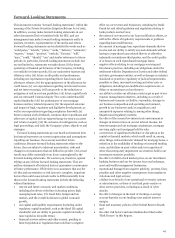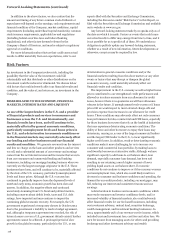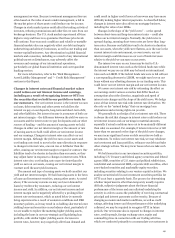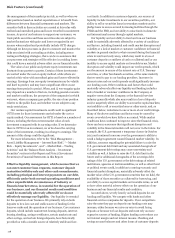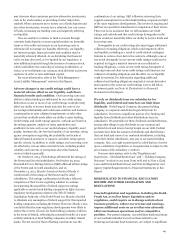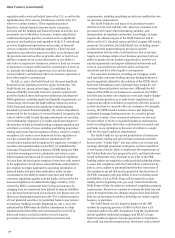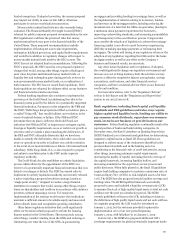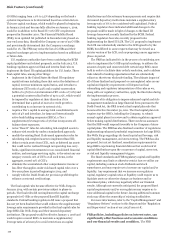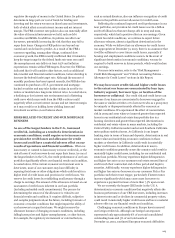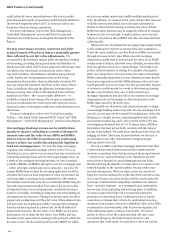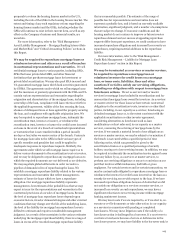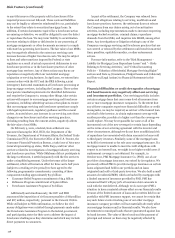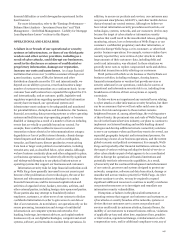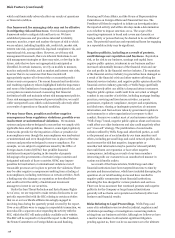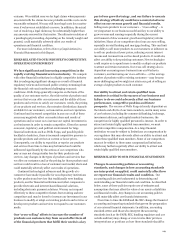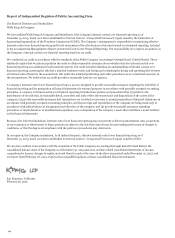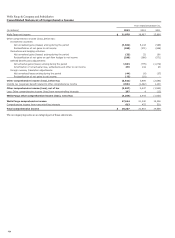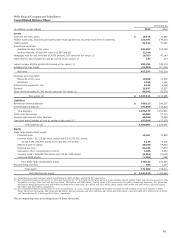Wells Fargo 2013 Annual Report Download - page 127
Download and view the complete annual report
Please find page 127 of the 2013 Wells Fargo annual report below. You can navigate through the pages in the report by either clicking on the pages listed below, or by using the keyword search tool below to find specific information within the annual report.proposals to reform the housing finance market in the U.S.,
including the role of the GSEs in the housing finance market. The
extent and timing of any such regulatory reform regarding the
housing finance market and the GSEs, including whether the
GSEs will continue to exist in their current form, as well as any
effect on the Company’s business and financial results, are
uncertain.
For more information, refer to the “Risk Management –
Asset/Liability Management – Mortgage Banking Interest Rate
and Market Risk” and “Critical Accounting Policies” sections in
this Report.
We may be required to repurchase mortgage loans or
reimburse investors and others as a result of breaches
in contractual representations and warranties. We sell
residential mortgage loans to various parties, including GSEs,
SPEs that issue private label MBS, and other financial
institutions that purchase mortgage loans for investment or
private label securitization. We may also pool FHA-insured and
VA-guaranteed mortgage loans which back securities guaranteed
by GNMA. The agreements under which we sell mortgage loans
and the insurance or guaranty agreements with the FHA and VA
contain various representations and warranties regarding the
origination and characteristics of the mortgage loans, including
ownership of the loan, compliance with loan criteria set forth in
the applicable agreement, validity of the lien securing the loan,
absence of delinquent taxes or liens against the property securing
the loan, and compliance with applicable origination laws. We
may be required to repurchase mortgage loans, indemnify the
securitization trust, investor or insurer, or reimburse the
securitization trust, investor or insurer for credit losses incurred
on loans in the event of a breach of contractual representations
or warranties that is not remedied within a period (usually
90 days or less) after we receive notice of the breach. Contracts
for mortgage loan sales to the GSEs include various types of
specific remedies and penalties that could be applied to
inadequate responses to repurchase requests. Similarly, the
agreements under which we sell mortgage loans require us to
deliver various documents to the securitization trust or investor,
and we may be obligated to repurchase any mortgage loan as to
which the required documents are not delivered or are defective.
We may negotiate global settlements in order to resolve a
pipeline of demands in lieu of repurchasing the loans. We
establish a mortgage repurchase liability related to the various
representations and warranties that reflect management’s
estimate of losses for loans which we have a repurchase
obligation. Our mortgage repurchase liability represents
management’s best estimate of the probable loss that we may
expect to incur for the representations and warranties in the
contractual provisions of our sales of mortgage loans. Because
the level of mortgage loan repurchase losses depends upon
economic factors, investor demand strategies and other external
conditions that may change over the life of the underlying loans,
the level of the liability for mortgage loan repurchase losses is
difficult to estimate and requires considerable management
judgment. As a result of the uncertainty in the various estimates
underlying the mortgage repurchase liability, there is a range of
losses in excess of the recorded mortgage repurchase liability
that are reasonably possible. The estimate of the range of
possible loss for representations and warranties does not
represent a probable loss, and is based on currently available
information, significant judgment, and a number of assumptions
that are subject to change. If economic conditions and the
housing market do not continue to improve or future investor
repurchase demand and our success at appealing repurchase
requests differ from past experience, we could continue to have
increased repurchase obligations and increased loss severity on
repurchases, requiring material additions to the repurchase
liability.
For more information, refer to the “Risk Management –
Credit Risk Management – Liability for Mortgage Loan
Repurchase Losses” section in this Report.
We may be terminated as a servicer or master servicer,
be required to repurchase a mortgage loan or
reimburse investors for credit losses on a mortgage
loan, or incur costs, liabilities, fines and other
sanctions if we fail to satisfy our servicing obligations,
including our obligations with respect to mortgage loan
foreclosure actions. We act as servicer and/or master
servicer for mortgage loans included in securitizations and for
unsecuritized mortgage loans owned by investors. As a servicer
or master servicer for those loans we have certain contractual
obligations to the securitization trusts, investors or other third
parties, including, in our capacity as a servicer, foreclosing on
defaulted mortgage loans or, to the extent consistent with the
applicable securitization or other investor agreement,
considering alternatives to foreclosure such as loan
modifications or short sales and, in our capacity as a master
servicer, overseeing the servicing of mortgage loans by the
servicer. If we commit a material breach of our obligations as
servicer or master servicer, we may be subject to termination if
the breach is not cured within a specified period of time
following notice, which can generally be given by the
securitization trustee or a specified percentage of security
holders, causing us to lose servicing income. In addition, we may
be required to indemnify the securitization trustee against losses
from any failure by us, as a servicer or master servicer, to
perform our servicing obligations or any act or omission on our
part that involves wilful misfeasance, bad faith or gross
negligence. For certain investors and/or certain transactions, we
may be contractually obligated to repurchase a mortgage loan or
reimburse the investor for credit losses incurred on the loan as a
remedy for servicing errors with respect to the loan. If we have
increased repurchase obligations because of claims that we did
not satisfy our obligations as a servicer or master servicer, or
increased loss severity on such repurchases, we may have a
significant reduction to net servicing income within mortgage
banking noninterest income.
We may incur costs if we are required to, or if we elect to, re-
execute or re-file documents or take other action in our capacity
as a servicer in connection with pending or completed
foreclosures. We may incur litigation costs if the validity of a
foreclosure action is challenged by a borrower. If a court were to
overturn a foreclosure because of errors or deficiencies in the
foreclosure process, we may have liability to the borrower and/or
125


